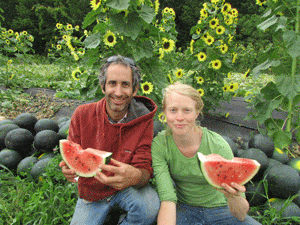[A version of this story originally appeared in The Cultivator, The Cornucopia Institute’s quarterly print publication available to members and online.]
 |
Matthew Goldfarb and Petra Page-Mann |
In the blink of the past 50 years, chemical corporations have come to control over 50% of the global seed supply. It’s a sharp departure from human history: farmers and individuals had saved local seeds for 14,000 years.
“There is a global systemic crisis in how our seeds are selected, bred, owned and distributed,” say the co-founders of Fruition Seeds, Petra Page-Mann and Matthew Goldfarb.
Part of a growing movement to relocalize — and reclaim stewardship of — seed production, Fruition Seeds in Upstate New York provides over 100 varieties of certified organic vegetable, grain, herb and flower seeds to Northeast farmers and backyard growers.
Other signs also point to the need for this work. The world has lost 75% of the genetic diversity in food crops in a mere century. As crop diversity diminishes, food crops go extinct, and plants lose the ability to adapt to climate change, pests and disease. Genetic patenting of seed (both GMO and hybrid) prevents many farmers from even saving their own seed, and GE pollen drift contaminates non-GMO and organic crops.
When Petra and Matthew met in 2011, it took “about 30 seconds” for them to discover their mutual passion for seeds, says Petra, a native of the Finger Lakes region that is now home to Fruition Seeds. The couple launched the company in 2012, but its roots go back decades.
Petra, 29, saved seeds as a little girl, fascinated by the cycle of life she watched unfold in her father’s garden. She started farming 10 years ago, focusing on small diversified organic farms, and has worked for seed companies on both coasts, including a multinational seed company. Matthew, 37, has designed and managed diversified farms, consulted for farms and farm-education groups, done ag research at Cornell, and taught high school biology and agriculture. He has an MBA from Babson College.
Today, most seed is conventionally produced in just a few places, such as Israel and the U.S. Pacific Northwest, for global distribution. It is “good enough” but not necessarily adapted to the environmental pressures a specific region faces.
“It’s important that we produce seed [regionally] because whether you’re breeding or just growing out, you’re making a choice about what genetics get passed on,” Matthew explains. Take, for example, their new red fire lettuce seed crop. Of the 1,200 or so lettuce seeds planted in April, after hundreds of them were “rogued out” (thinned) at various stages of transplant and maturation in the field, only 80 plants remained. “This is stock quality seed,” Matthew explains, “and we’re distributing it as commercial seed for everyone.”
Adds Petra: “Resilient genetics is the heart of a resilient food system.” That’s what Fruition Seeds is all about. With seed saving instructions in every packet and DIY video tutorials on the website, the company eschews both the typical American business model that seeks to crush the competition and the corporate restriction of seed ownership. “The work we’re ultimately trying to do is develop regional seed for the Northeast that can deal with climate change and other pressures,” Matthew explains. “This is a regionwide effort, from the backyard grower to the seed company to the chef to the eater,” he says.
Toward this end, other regional organic growers partner with Fruition Seeds, mutually buying and selling surplus seed to augment each other’s markets. A few large-scale organic farmers are collaborating with Fruition Seeds to develop new varieties. The win-win arrangement gives the seed company the opportunity to do large-scale breeding over several years without the high cost (typically $250,000 to develop a new seed variety) while the farmers get highly specialized seed for their farms and their markets.
Fruition Seeds is just finishing its first growing season. Response from Northeast growers has been phenomenal, says Petra. “Where the local food movement was 20 years ago, local seed production is now,” she explains.

